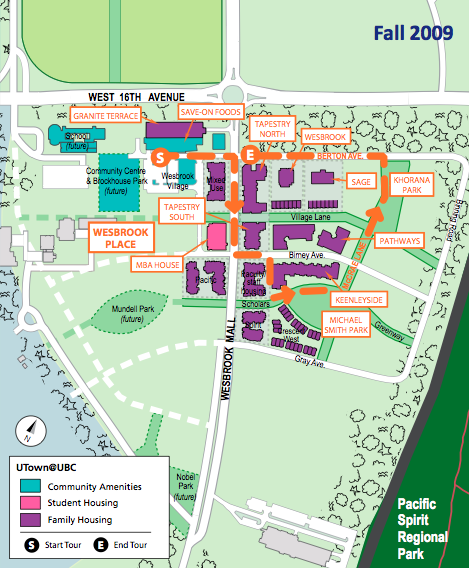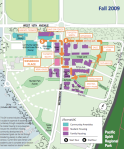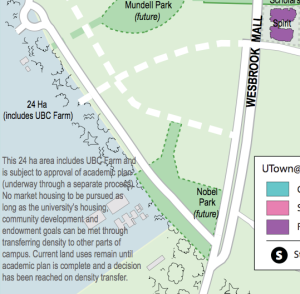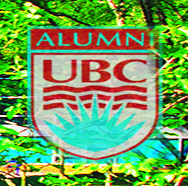This essay is an investigation into recent media regarding the underground bus loop development project failure at UBC. The AMS President Blake Frederick issued a public report to the university, saying that the university President, Dr. Toope should be held accountable for the failure of a project that had been a ‘flawed’ from the beginning.
Dr. Toope wrote a letter back to Frederick complaining about the AMS report on the bus loop. Strong language is used on both sides, and the Ubyssey has attacked Frederick viciously because of his reprimand through an editorial (i.e., Ubyssey editors 2009a).
Frederick almost got ‘censured’ by the AMS council for his press release, but won through a close margin 21/17. The Ubyssey uses the same language Frederick used to describe the administration to describe Frederick, defending the university administration stance, and mirroring their rhetoric and explanations.
This work is an attempt to analyze the language in both sides of the argument, from source documents that include official publications and letters from the AMS and the University administration, as well as student media articles (not of our authorship) related to the bus loop issue.
THE AMS PRESS RELEASE: Reactions and Background
With the AMS press release, the UBC administration felt threatened with what Prof. Stephen Toope, UBC President, argues, are ‘unfounded allegations’. We will go into considerable detail on the words associated by Toope with the present AMS administration later. We shall focus now on how Frederick put the current administration under pressure, and whether or not there were precedents for calling for their accountability.
In the AMS press release (AMS 2008), it is stated that “[t]he decision to have one central below-grade bus terminal on campus emerged from the 2003 Campus Transit Plan—prior to any public consultation”. This seems like the beginning of the “grave allegations” and the ‘odd’, ‘intemperate and ‘injurious’ tone (Toope 2009) of the AMS press release, attributed, at least in blame, to Frederick alone. However, before Toope was hired for over 500k CAD/year, the AMS issued a press release entitled “UBC Passes Development Plan Despite Student Opposition”, which stated that “despite concerns raised by all present elected members of the Board” the “UBC Board of Governors passed a motion to endorse the University Boulevard Neighbourhood Plan”. Note that the distinction between what ‘elected’ members of the Board and the ‘unelected’ think is sharp.
This ‘plan’, states the press release, “will see the bus loop moved underground, shops and services built directly outside the Student Union Building and developments of university housing to be rented at market rental rates” (AMS 2003). This press release, issued on the same day of the Board of Governor’s (BoG) decision, set a strong precedent to Frederick’s late press release that caused so much fury in the mainstream student press (see Jung 2009 and Ubyssey Editors 2009a).The consultation was already biased and problematic, and the opposition to the tunnel was never fully considered, despite the efforts of people like Dr. Darren Peets (see Peets 2008).
“[T]he University”, continued the AMS press release of 2003, “had not outlined a timeline, the stakeholders involved, the method or form of consultation or the process as to how stakeholder recommendations would be incorporated” (AMS 2003). Students were already worried, in 2003, that their ideas were not being considered before decisions were made. Eventually, through a lot of activism, students were able to stop the shopping mall project and the market housing the administration had envisioned.
“I am disappointed that the Board of Governors did not recognize the importance in supporting and allowing for the student consultation process to continue. It is imperative that student’s are actively involved in the overall process as they represent a major stake holder in the campus planning projects,” –Amina Rai, Elected Student BoG member (AMS 2003).
Now, was Frederick’s ‘tone’, notably a very subjective notion, inappropriate? We shall consider how it compares with Prof. Toope’s tone in his retaliatory letter (Toope 2009). The ‘Frederick’ press release of 2009 stated that the failure of the bus loop project “will severely damage students’ confidence in UBC’s campus planning”. He also complained that UBC was not responding to an AMS “request for information on how much money they have squandered on the underground bus loop” which “could be in the millions”, a lot of ‘money’ “UBC has wasted” (AMS 2009). The strong words here are the ‘squandering’ and ‘waste’. This received a sharp direct response by Toope (2009) and the Ubyssey editorial (2009a), each focusing on a different ‘hot’ term employed by Frederick. For instance, the Ubyssey editorial attacks Frederick for having “squandered any chance of students playing a meaningful role of making sure the Olympics doesn’t cause undue disruption to this campus in February” (Ubyssey editors 2009a); and Toope (2009) complaints about ‘unproductive’ negotiations with AMS on the SUB and Olympic projects, leading to “true mismanagement and waste”.
In addition, the AMS President argued that “UBC President Stephen Toope and the UBC Board of Governors must be held accountable for their mismanagement of UBC’s funds” (AMS 2009). I believe, as hired officials, they would be accountable for any instance of mismanagement. The important question now is – was there mismanagement of any sort in the process leading to the release of funds to the terminal and tunnel, and later with the TransLink funding cuts? According to the Freedom of Information and Protection of Privacy Act of British Columbia, students can request, and the university cannot deny, the following information:
(i) a feasibility or technical study, including a cost estimate, relating to a policy or project of the public body,
(j) a report on the results of field research undertaken before a policy proposal is formulated,
(k) a report of a task force, committee, council or similar body that has been established to consider any matter and make reports or recommendations to a public body,
(m) information that the head of the public body has cited publicly as the basis for making a decision or formulating a policy, or
(n) a decision, including reasons, that is made in the exercise of a discretionary power or an adjudicative function and that affects the rights of the applicant.
If we take a look at the Board of Governor’s minutes from the May 2007 meeting, chaired by Brad Bennett, and with Prof. Toope as the recently hired University President, we will see that the reasons given by the administration for not considering the ‘petitions presented by students expressing “their concern about the underground portion of this building project” were that:
“A number of studies and reports over several decades have supported an underground tunnel and transit station as the only sustainable way of managing campus transit needs. Administration is supportive of further consultation with respect to above ground University Boulevard buildings.
“Information from Translink in regard to future services has been considered; the proposal does meet their long-term approach to transit on campus. Issues of noise and ventilation have been discussed at length and will be satisfactorily addressed.
“Translink is responsible for security and take the issue very seriously. Any delay in approval would likely result in a 12-month delay, delaying completion o f the overall project until 2010. Delay would also impact commitments and agreements with various external partners and may result in more stringent obligations being imposed on the University during the upcoming OCP review” (BoG meeting minutes, May 22, 2007).
According to these statements by the administration, there are no possible alternatives to the underground tunnel, because it is the “only sustainable way of managing campus transit needs” (BoG 2007). At this point, after defeating the motion to table the decision, they approved the release of $15,505,000 for the “road, utilities, and tunnel”. As highlighted above, students have the right to demand to examine the “number of studies and reports over several decades” that have led them to conclude, without consulting students and ignoring their petitions, that the tunnel was the “only sustainable way” to deal with transit issues at UBC. The key question in this case is the definition of ‘sustainability’. How could what Dr. Darren Peets described as a “diesel-soot-blackened tunnel, followed by a well-lit and possibly well-finished crowded concrete basement” with a surface taken over by “shopping, parking and a plaza” (Peets 2008) fulfill the university’s sustainability needs?
Toope (2009) explained in his letter of retribution to Frederick that “[t]he fact that this plan cannot go forward is due entirely to the budget problems of our partner in the project, Translink”. He also assures, with ‘absolute clarity’ that “no construction has been carried out on the tunnel” and that an “inclusive process to explore viable transportation options will now be undertaken”. Toope still holds on to the position that students were wrong in all their concerns about the bus loop, since “the Administration and Board remain of the view that the below-grade station was the strongly preferred approach for maximizing user access and safety in a lively, student-oriented square, including substantial traffic for the new SUB and its programs and services” (Toope 2009). What should be investigated is the administration’s extreme confidence that the tunnel was the best way to proceed. After all, the AMS even has an official policy against the tunnel. The official AMS position, passed in council on May 2nd 2007, is to “support and endorse the petition against the current University Boulevard development plan” and to “oppose the current University Boulevard Neighbourhood plan and design”.
The AMS argued that the consultations with students were “vastly inadequate” and that “the more than $30 million funding for the underground bus loop […] would be more appropriately spent on more cost-effective transit models and on improving greatly needed services such as daycare, for which there is currently a waiting list of 1300”. The Board of Governors subsequently ignored this policy and determined that the underground bus loop was the only sustainable way to go, even if it was against the will of the AMS and those 2600 students who signed their names into a petition circulated during finals. The AMS also noted that ”the unexpandable underground bus loop would not physically be able to accommodate future increases to transit service to campus, and would not serve the needs of students or University Town residents”, and that the students were “dismayed by the proposed elimination of the grassy knoll, the lack of green space in the project, and project’s plan to allow car traffic along University Boulevard from Wesbrook Mall to East Mall, which will disrupt the atmosphere and decrease the safety of the area” (AMS policy, May 2nd 2007).
Given all this information, it seems that Frederick’s (i.e., the AMS’s) claim that the $400,000 spent on the design of a facility that will not be built were ‘wasted’ may be not only true, but also due to mismanagement. After all, the students even made an official policy stating their opposition to this part of the project and the university administration would not budge no matter what. The administration keeps talking about sustainability and meaningful consultations, taking into account people’s opinions. If you look at the minutes for their consultation sessions, you will find that there are usually not even 100 people in a predetermined consultation session. Meanwhile, 2600 students signed the AMS petition and their voices were ignored, even if they were going to be apparently the final ‘beneficiaries’ of this project.
As Dr. Darren Peets has noted (2008), the “decision to build entirely below grade and the plans for the development atop it were made prior to consultation, and the public consultation followed UBC’s then-standard model of design-display-defend”. This characterization of the UBC consultation process as based on a “standard model of design-display-defend” seems quite accurate, especially given the whole process that led students to organize for the Great Farm Trek of April 7th 2009 to defend the Farm from the administration’s plan to turn it into housing, again, despite the usual “consistent, vociferous criticism” (Peets 2008) the consultation process draws from students. For Peets (2008) as for many students, the underground bus loop would have cost $31 million to UBC that
“would otherwise either be in the endowment, building childcare, beautifying campus, or creating social space. A bus terminal may be nice to have, but $31M nice? Is a student more likely to drop out of school from lack of childcare, or from an extra block’s walk in the rain?” Peets (2008).
There seems to be a degree of systemic confusion regarding the problems with the underground bus loop, consultations, and mixing all that with the arrests of April 4th 2008. Costeloe (2009), for example, complaining that Frederick was not censured, argues that the AMS takes a soft line when it comes to punishing executives who “are out of line”. Costeloe also mixes a bunch of other issues into his opinion piece, including divisions in the student body regarding the ‘positive’ and ‘negative’ impacts of the 2010 Winter Olympics. Green College has been hosting a critical series on the Olympics that has been quite informative and that was set up in response to many students’ uneasiness with the uncritical pro-Olympics stance of the administration. It seems like, under no possible circumstance Costeloe would assume that the position of the administration regarding the underground portion of the new bus loop was problematic. He mentions as an example Stef Ratjen, former AMS VP External, who, he claims,‘incited a riot’, disobeyed “lawful orders, blocking firemen, and finally being dragged off into a cop car”.
As an eye-witness to the ‘events’ that Costeloe, the Vice-Chair of the UBC Vancouver Senate, is apparently referring to here, I can attest that Ratjen did not incite a riot, nor got “dragged off into a car”. She was indeed sprayed in the face with a hose and thrown into the ground with the face in the foam for five minutes, and got handcuffed, because she had approached the firemen to ask them to allow students to take out their musical equipment, still plugged into the university grid. Ratjen had not been around for much of the music festival and petition drive that was happening before, and showed up after the fire was lit. In any case, she had nothing to do with the fire, which was the product of a couple of individuals’ actions without any previous consent of the crowd. When I saw the fire, I realized that there would be problems, but there was nothing that I could do, except to take pictures. The fire itself went on for over an hour before the ‘authorities’ noticed and began setting up their troops to ‘crack down’ on the ‘unlawful-festival-organizing-dancing-around-the-bonfire students’. Later, while she was being kept face down into the foam by the ‘lawful’ firemen and handcuffed, students, in solidarity, jumped into the foam and locked arms with Ratjen until the cops released her from the cuffs and took her documents.
The rest is history – students believed that her release set a precedent for the release of a person that had been wrongfully arrested and brutally manhandled in front of me and other eye-witnesses, and moved to surround the police car in which he was being held. Upon the arrival of more police troops, some students remained sitting around the police car, and ‘obstructing justice’, and they were subsequently dragged, threatened with tazers, and taken into jail for one night. Ratjen was hit by the misfortune of being subjected to the attacks of people who could only pass judgment from the distance the media on the issue provided. Yes, some people did get too excited and out of line, and that was problematic, but this was not the spirit of the manifestation, but a misfortune that stigmatized it in the eyes of the cold and judgmental outside onlookers. Still, although this group of people was opposed to the underground bus loop, the extent of that opposition transcended the social realm of the so-called ‘hippie’ left (e.g., AMS 2003, AMS 2007, Peets 2008).
Costeloe has also expressed concerns about a ‘sickness’ that is afflicting the AMS by influence of its executive, and seems to be still unconvinced about the extent of the student opposition to the underground bus-loop (see Jung 2009). Michael Duncan, past AMS President and current Board of Governors elected student representative thought that the move to censure Blake Frederick, apparently brought forward by Bijan Ahmadian, who works personally for Prof. Toope, was an over-reaction.
Duncan argued, after the motion to censure Frederick failed that “people blow these kind of things out of proportion and that the university deals with these kind of things all the time” (Jung 2009). In addition, Duncan stated, “[a] lot of students oppose this bus loop and [Blake] is trying to represent the interest of the society and of students” (Jung 2009). At least in Duncan’s position, Blake Frederick is doing the right thing to inform student about the failure of the tunnel and to demand accountability for those responsible.
If the university has nothing to fear, they would have not taken Frederick so seriously, because they would have nothing to lose. The problem, I would guess, is that if people really investigate critically how decisions were made regarding the tunnel, it would be proven that students’ input was not seriously considered or even properly surveyed. The least we should know in detail is who were the contractor beneficiaries of the money that was spent, and the substance and credibility of the studies conducted to make the administration conclude that the ‘underground bus loop was the only sustainable way to go’ (BoG 2007). Toope’s letter, however, was a very strong response. I will now take a detailed look at the language Prof. Toope employs in his letter and whether it is appropriate and professional. If Toope’s letter is an over-reaction, we should be wondering why. If it is granted on our principles of engagement, we should try to figure out how.
TOOPE’s RESPONSE LETTER:
Let us concentrate on the facts first – how exactly does UBC President, Dr. Stephen Toope, characterize the current AMS administration, and Blake Frederick’s actions? The Ubyssey (2009a) editorial refers to Blake’s letter as a ‘poke in the eye’ of the university, like ‘kicking a dead dog’. But Toope’s retaliatory letter, that essentially condemns Frederick to oblivion and social alienation, with possible grave repercussions to a student’s future and career, was more like a nuclear explosion than a ‘poke in the eye’.
In Toope’s letter (Toope 2009), the AMS and Frederick are associated with an ‘unproductive strain’, “true mismanagement and waste”, the ‘firm declination’ of offers to present to students the views of the administration (i.e., intransigence), an ‘aggravated climate’ that could have a “corrosive impact” on the “reputation” of the university – something “destructive” that led to the ‘erosion of goodwill’ through ‘grave, unfounded, intemperate, and injurious allegations’. Those are the ideas put forward in Toope’s letter about the AMS. Toope also does a lot of work defending his own position and listing ‘positive’ things that he has been trying to get done but that have been supposedly hindered by Frederick, the scapegoat, and his executive. For instance, Toope and the administration will undertake “an inclusive process to explore viable transportation options”. He also claims to be “absolutely clear” that “no construction has been carried out on the tunnel”, that the “new Place and Promise Strategic Plan focusing on student learning, sustainability and other commitments is emerging” and that “confidence is growing in the donor community” , that “we are finally making some headway on negotiations for the new SUB”, and that “the Vancouver Campus Master Plan is coming to fruition”, all of which have been now compromised.
For many observers, this seems like an emotional over-reaction possibly related to fear, or having something to hide from the public. What it certainly does is to divert the focus from the actual problem (i.e., the $400,000 minimum already spent on the bus loop), and into Frederick and his ‘tone’. Toope’s letter triggered automatic emotional reactions by the student media, which seems irresponsible. I believe that if the administration is absolutely correct about their claims and had nothing to fear about the underground bus loop and the expenses that went into its design instead of going into more important areas (e.g., funding and childcare), they would have dismissed Frederick’s press release with softer words and simply correct his ‘misinformation’ by proving that students favour the bus-loop. The problem is that such a thing is impossible, given the 2500 signatures and the official AMS (2007) policy, in addition to all the evidence of student disappointment with the consultation process.
If this issue is seriously investigated by an unbiased external agency, I believe that it will be proven that, at the very least, consultations were inadequate, and the studies cited by the administration in the Board of Governor’s meeting minutes of May 22nd 2007 were outdated and did not take student input into considerations (for more on the technical problems with the bus loop see Peets 2008). I believe the readers should be able to figure out on their own whether the response to the AMS press release by Prof. Toope was appropriate and professional (i.e., not hypocritical).
WHAT NOW? RECENT DEVELOPMENTS:
The repercussions of the failure of the underground bus-loop project and the altercation between Frederick and an aggravated and defensive Toope are still coming out in the mainstream student media. The Ubyssey recently published another editorial piece (2009b) informing students that “AMS President Blake Frederick and UBC President Stephen Toope met on Friday and made steps toward reconciling their issues regarding the underground bus loop project”. It would be reasonable to hypothesize that Toope realized, after the fact, that his letter was disproportionally strong, condemnatory, not diplomatic, and careless, which is what some people were ready to accuse Frederick of on account of ‘his’ press release. The Ubyssey characterized Toope’s response as “unusually strong and condemning” (Ubyssey editors 2009b). According to the article, Frederick and Toope got together to make a commitment to “move past the issue of the underground bus loop”, because the project “will be cancelled” and the AMS and the administration “need to work together” (Ubyssey editors 2009b). Now Frederick and Toope shall be forgiven and come out with a beautiful, inclusive plan, and forget about past offenses. Again, the university should avoid any more investigations into the underground bus-loop decision-making process.
What could be suggested as a good solution that would allow the current administration to escape from scrutiny would be the serious implementation of a program to assess student opinions in development issues that allowed for constant and transparent live feedback that is translated into actual projects. The administration will have to prove that the UBC Farm is a priority that should be expanded and fully funded (it could have used a lot of that underground bus-loop money, for instance).
We can imagine countless better applications for the money that is luckily not going to be spent with the underground bus loop project. The university should team up with the AMS to envision proper feedback collection strategies that can identify how students would like to see funding allocated. One line of reasoning that could be implemented is that being stakeholders because of their tuition funding, students should be in charge (or have more power over) how that money gets allocated. Even if they are not the final decision makers, the university should at least find out what their opinion is regarding an ideal funding allocation strategy in order to be better informed.
It is hard to predict what will come out of this, but I wish that it, somehow, shall bring students together rather than break them apart. It is clear that there are issues with consultations, and the student union should take responsibility for making steps to fix that. There’s an urgent need for the creation of a proper feedback system that is able to reflect what the opinion of students actually is regarding specific development projects, and countless other issues that could be better translated into the technocratic and bureaucratic languages and processes that are privileged by the administration.
REFERENCES:
Alma Mater Society
2003 Press Release: UBC Passes Development Plan Despite Student Opposition.
2007 Policy on the “University Boulevard Plan”.
2009 Press Release: UBC Plans to Cancel Underground Bus Loop, Students Demand Accountability. Oct., 7th 2009. http://www2.ams.ubc.ca/index.php/ams/news/ubc_plans_to_cancel_underground_bus_loop_students_demand_accountability/
Costeloe, Geoff
2009 AMS: Spare the rod and spoil the child. In The Ubyssey, online, Nov., 9th 2009. http://ubyssey.ca/news/?p=10909
Jung, Samantha
2009 Frederick survives censure attempt. In The Ubyssey, online. Nov., 5th 2009. http://ubyssey.ca/news/?p=10827
Toope, Stephen
2009 UNTITLED: Letter [PAGE 1] and [PAGE 2] to AMS Council About Underground Bus Loop Failure. Oct., 28th 2009.
UBC, Board Of Governors
2007 Meeting Minutes, May 22nd 2007.
Ubyssey Editors,
2009a Editorial: Does Frederick deserve the benefit of the doubt? In The Ubyssey, online. Nov., 5th 2009. http://ubyssey.ca/ideas/?p=9043
2009b Editorial: President vs president. In The Ubyssey, online, Nov., 9th 2009. http://ubyssey.ca/news/?p=10896
*Rodrigo Ferrari Nunes is a UBC alumnus (B.A., 2006) and Anthropology Master student.







 There is a wide range of opinions expressed on whether the student resistance has had any effect in the failure of the underground bus loop project. This article examines two opposite opinions expressed in this public debate – 1. ‘The student resistance has nothing to do with the failure of the underground bus loop’ (e.g., McElroy 2009, and Knight 2009); and 2. ‘If it were not for the student resistance, the underground bus loop would be under construction” (e.g., Morgan and Frederick). I present you an analysis of both sides in order to generate more discussion on this issue.
There is a wide range of opinions expressed on whether the student resistance has had any effect in the failure of the underground bus loop project. This article examines two opposite opinions expressed in this public debate – 1. ‘The student resistance has nothing to do with the failure of the underground bus loop’ (e.g., McElroy 2009, and Knight 2009); and 2. ‘If it were not for the student resistance, the underground bus loop would be under construction” (e.g., Morgan and Frederick). I present you an analysis of both sides in order to generate more discussion on this issue.



